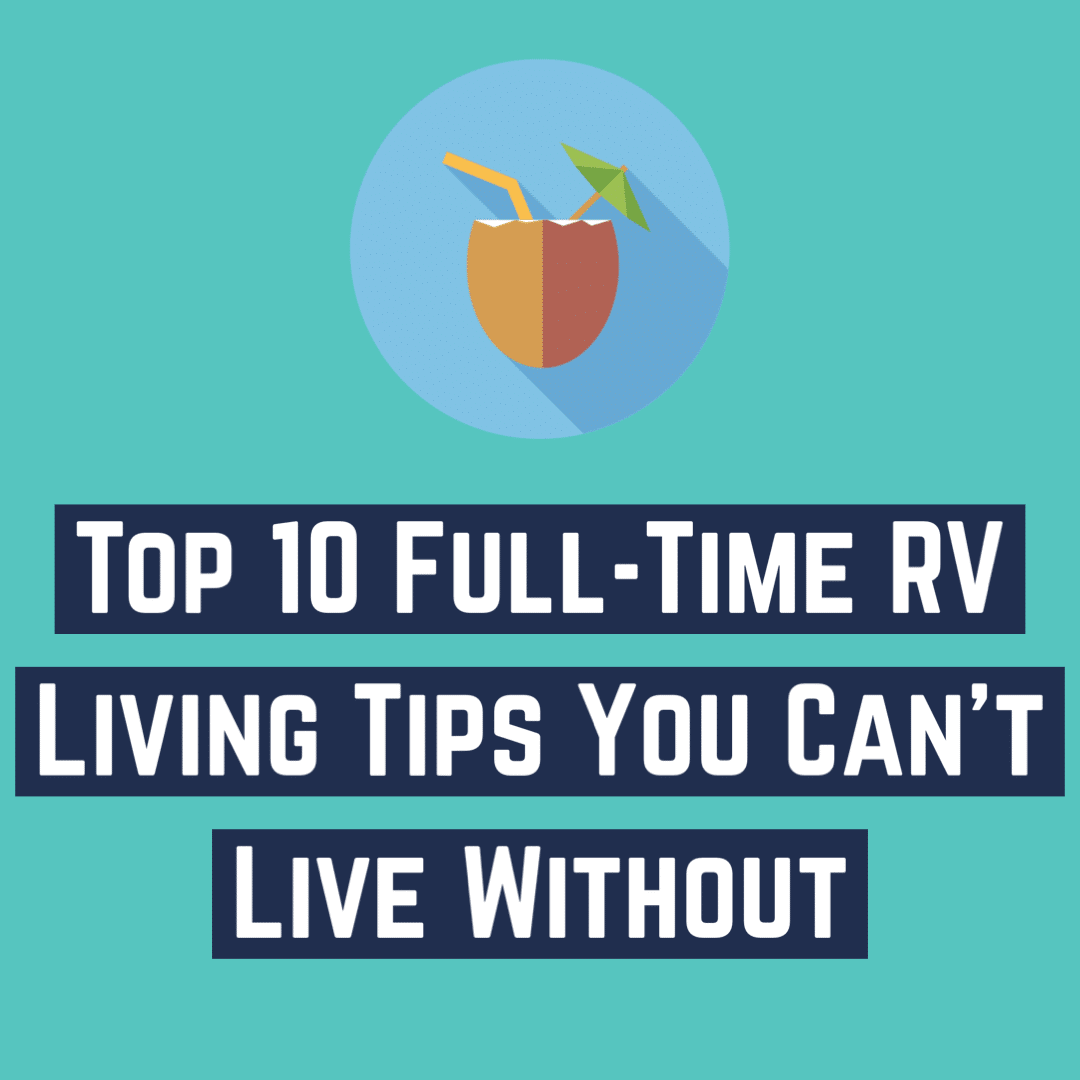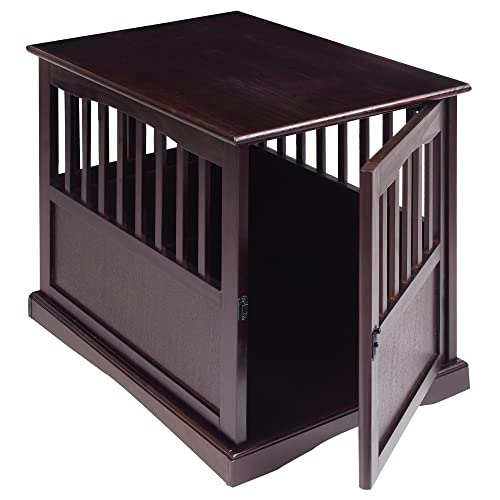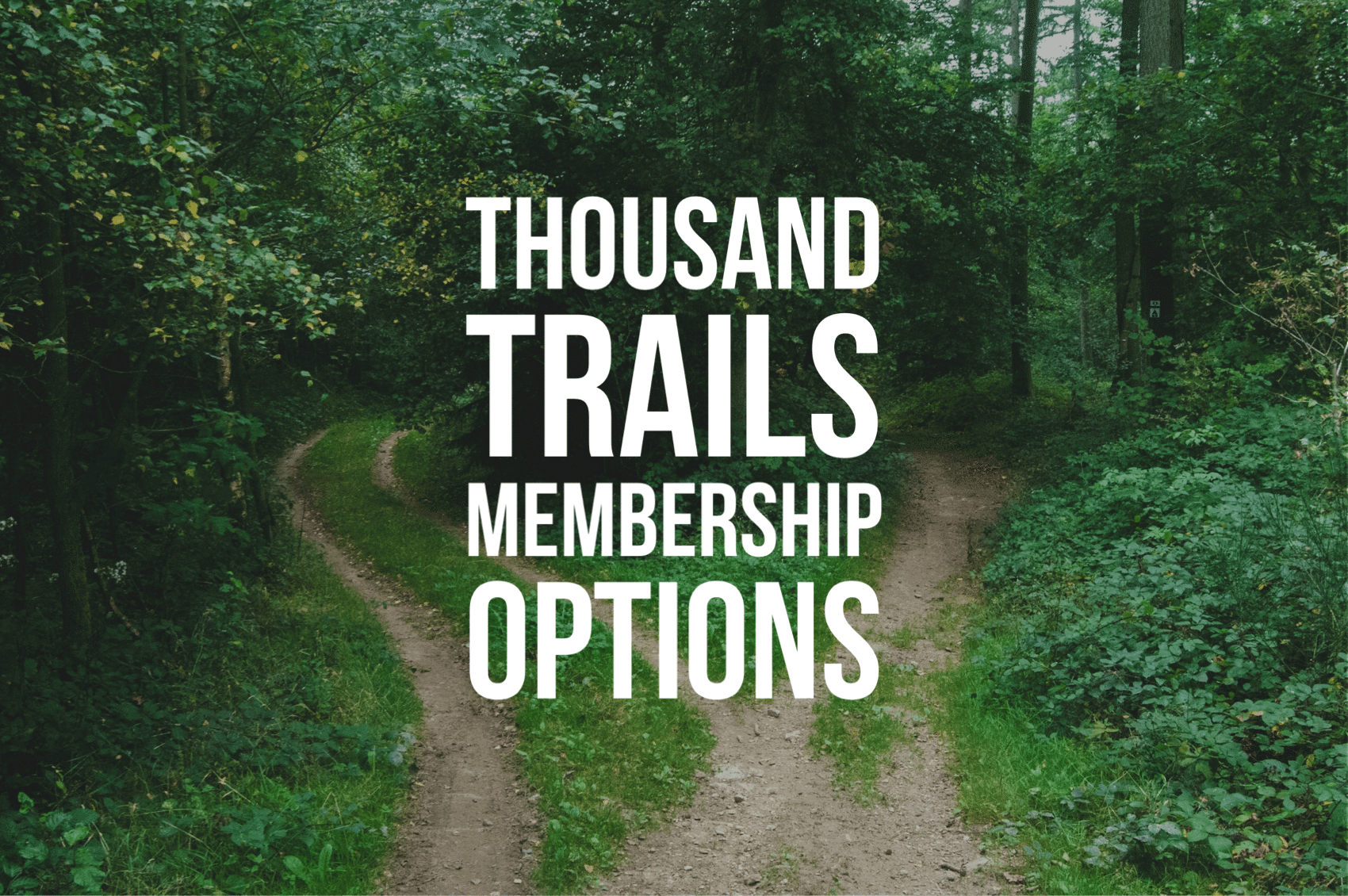Table of Contents Show
Are you ready to hit the road in your RV? You might even be considering living in your RV full time. Are you dreaming of the freedom of the open road with no commute and different beautiful views right outside your door? These ideas have drawn many people into the RVing lifestyle. For many, it’s a dream come true. But for others, their vision may fall a little short of the mark when the reality of living in a recreational vehicle hits them. Not everyone is cut out for full-time RV living. Regardless of whether you are living in a luxurious top of the line model or an ultra-lightweight travel trailer, it’s a significant adjustment and lifestyle change. There are many things you need to take into consideration before you hit the road. Here is our list of the top 10 full-time RV living tips that you can’t live without.
Select your Domicile State
Our first full-time RV living tip is to consider your domicile state carefully. Just because you will be living in your RV fulltime does not mean that you will be carefree. You will still have some responsibilities. Choosing your domicile state is an important decision. It involves legal paperwork concerning your vehicle registration and tax filings.
The top three states for full-time RVer domiciles are Florida, South Dakota, and Texas. These states are all income tax-free. The vehicle licensing fees, and annual inspection requirements are reasonable. And their government entities accept mail-forwarding addresses from mail forwarding services.
For entrepreneurs, the ease of running a business from those states is also a significant factor in making it a great home base.
To establish domicile within a state, you must have a permanent address within that state and have your mail forwarded to that address. Some full-timers will rent a campsite at an RV park on a long-term basis. Some might even go so far as to purchase a deeded RV lot. Others may choose to have just an address in that state without renting or buying a property.
As for mail forwarding, unless you have someone willing to collect all of your mail and forward it to you periodically, you will need to consider using a mail forwarding service. Even with sending and receiving correspondences, bills, and notices over email these days, there are still some things that will come via snail mail. You need to have a plan in place before you leave to make sure you receive all of your essential correspondences.
Storage Solutions Tips
Transitioning from a home to an RV presents quite a challenge for the average person. Most people end up renting a storage space to store most of their belongings while they are on the road. But you will need to bring as much as you can with you. But where should you put it all? That’s where the challenge comes in. You need to be creative in finding and utilizing all the nooks and crannies in your RV.
Our next full-time RV living tip is that hooks are your friends. Permanent hooks, temporary hooks, suction cup hooks, it doesn’t matter. You can place hooks under and on the side cabinets and shelving, in high corners, on curtain and shower rods, as well. Hang suction cup hooks on windows and metal surfaces such as oven hoods and refrigerators. Use magnetic strips inside cabinet doors for small metal items and containers. Command strips work well for lightweight items, as well.
Hanging organizers are great too, whether they are the plastic or cloth kind, you can cut them down to the size and shape you need to fit them into tricky spaces. Shoe racks make great shelving, as well. Narrow containers fit well into empty, compact spaces.
When coming up with small space storage solutions in your RV, you need to get creative and think outside the box.
Traveling with Pets
Pets are part of your family, too, but traveling full time with pets can be a challenge. Whether it’s a cat, dog, bird, or hamster, you will need to carve some space out of your own space for your furry friend. Cats require a litterbox; some dogs might require a kennel; other pets may require a cage. Whatever the situation, you will need to find space in your already cramped area for your pet.
To keep from tripping over the litterbox, you could put the litterbox in the shower. Just be sure to put a mat of some kind over the drain to keep any spilled litter from going down the drain.
- Solid wood construction for pet-safe durability and longevity | Made in Thailand
- Lockable gate for your peace of mind
If you have a medium or large dog kennel, you can use the kennel as extra seating by placing a few throw pillows on top, or if you place a cloth on top of it, you might be able to use it as a table of some sort.
Birdcages can be hung from the ceiling by hooks in the corner. Small animal cages can be hung up as well, but if not, they should be attached to a flat surface to stabilize them.
Since you are more likely to encounter situations where your pet may get sick or hurt, we recommend getting pet insurance to help keep your mind at ease. It will relieve you of the financial stressor in a situation where your pet is at the vet.
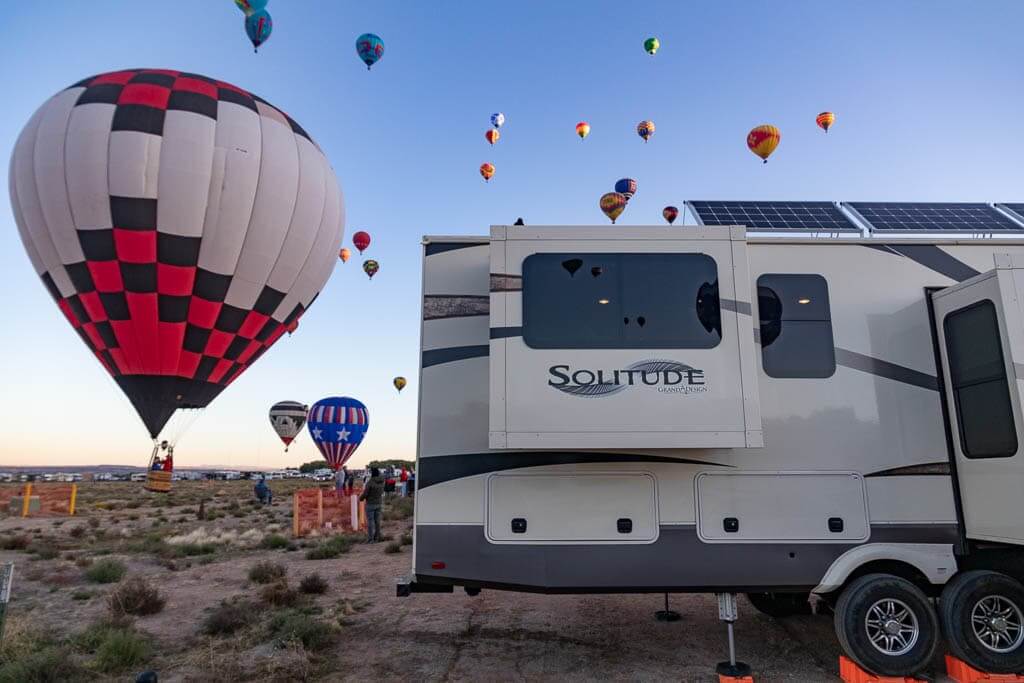
Life on the Road Full-time
Full time traveling offers so many opportunities for meeting new and interesting people. The world of RVers seems to be one big happy family. When you meet new RVers, there’s an instant, intimate connection that happens, a camaraderie between part-timers and full-timers living the mobile lifestyle.
In addition to the fellow RVers, you’ll get to discover interesting and exciting places. Think of all the places you can go:
- Visit the Albuquerque Balloon Fiesta
- Attend Mardi Gras in New Orleans
- Experience the Redwood forest
- Try deep dish pizza in Boston
- Dig for diamonds at the diamond mine in Arkansas
- Visit Times Square in New York
- Go skiing in Colorado
You are limited only by your imagination (and your gas tank).
Camping in your RV
Eventually, you must stop driving and park your rig somewhere to sleep. Finding the right place to camp might require a bit more effort on your part. There are several things you need to consider when looking for a campground or an RV park especially if you have a big rig.
- Safety – make sure you are not camping in a high crime area.
- Clean – make sure the campsite is not dirty or under construction
- Easy Access – Make sure there’s enough room for your size rig, and that you can easily backup or pull through.
- Room to Spread Out – Make sure you have enough room to expand your slide-outs and awnings. You might want additional space for your chairs and your barbeque pit, too.
- Space for Your Vehicle – If you are towing, you’ll need space to park your vehicle, as well.
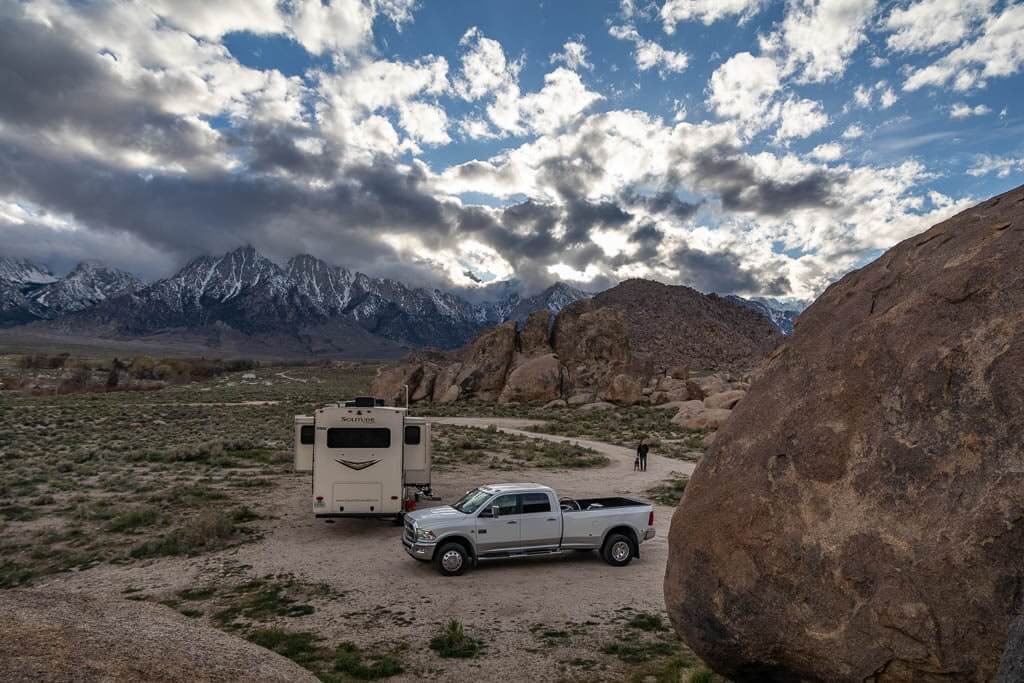
Boondocking in your RV
Boondocking is when you dry camp in a location where there aren’t any RV hookups, usually a remote location, off the beaten path, so-to-speak. Boondocking isn’t for everyone. It requires a bit more of the “roughing it” mentality, and you need to be well prepared for this type of camping.
Boondocking is allowed on federal public lands within a specified distance from an established road, except where specifically restricted. Just remember that camping within 300 feet of a water source is usually restricted.
There are some US National Parks that allow overnight RV parking and boondocking, but usually camping is restricted to established campgrounds.
Summer and Winter RV Extremes
Usually, full-time RVers travel with the weather and try to stay away from extreme conditions. Down south, the summer months can be brutal on your rig’s air conditioning. When the weather outside is over one hundred degrees it makes it difficult for your a/c to keep your RV cool enough.
But winter has its challenges, as well. If you plan on RVing someplace during freezing weather, you will need to ensure your RV is 4 seasons ready. The biggest thing is you will need to ensure your water system is protected because pipes can bust on an RV, just like on a brick home.
Be aware of possible appliances that may cause carbon monoxide poisoning. There have been reports of campers dying because they tried to use charcoal and propane heaters inside their vehicles.
Working Remotely
It is possible to work remotely while living in a home on wheels. Most full-time RVers have some source of income while living in an RV. Online jobs are more and more popular. Bloggers, YouTubers, freelance writers, affiliate marketers, these are just a few of the jobs you can do for an income to support traveling on the road full time. The internet is full of ideas on ways to make money online. Do your research and choose the option that best suits your lifestyle.
Pro Tip: Are you sure the RV lifestyle is for you? Read Top 5 Worst Things About Full-Time RV Living before you commit!
Frugal RV Living
There are two main opinions when it comes to how much full-time RV living costs. People either think it’s super cheap because you don’t have a mortgage and living expenses, or they think it’s super expensive because of the price of gas and paying for campgrounds every night.
Both opinions are correct to a certain degree. Living in an RV falls somewhere in the middle. You no longer have a mortgage, but you might have an RV loan payment. Gas for an RV can be expensive if you are always driving. And you do have to pay for campgrounds with electric hookups, and facilities to dump and refill your fresh and wastewater tanks.
And don’t forget the cost of your RV’s registration and insurance. You might have a mail forwarding service you pay, as well. Not to mention the cost of food, occasional entertainment, RV repairs, and other things that may pop up. These things can add up quickly.
But there are things you can do to help bring those costs down to a more frugal level. One of our biggest full-time RV living tips is becoming members of a campground membership club like Harvest Hosts and staying free overnight at beautiful and peaceful locations such as wineries, breweries, museums, and country clubs.
For as little as $120 per year, you have access to a directory of over 1200 Harvest Host locations where you can park your rig overnight and stay for free. All they ask is that you make an appreciation purchase from them or a local business for as little as $20.
But if you do decide to stay at a campground, invest in a discount camping membership, such as Passport America. For less than $50 a year, you can get up to 50% discounts at participating campgrounds all across America. You can also stay a little longer. Most campgrounds offer discounts for more extended stays.
However, since you are heading fulltime, it is almost irresponsible to not check into a Thousand Trails membership. If you plan your travels around their campgrounds you can pay less than $1000 a year.
Other ways to live frugally are to skip the grocery store and find thrift bakeries and dollar stores to purchase your groceries. Take advantage of early-bird specials and happy hours when eating out. Look for online coupons for restaurants, such as 2-for-1 deals and half off deals. When you need to replace clothes and housewares, hit the thrift stores and resale shops. Learn to do your own RV maintenance.
Go Solar
Our last full-time RV living tip is to install solar. More and more campers are choosing to go solar as a source for their primary electric power instead of relying on campgrounds for electrical hookups. Going solar gives you more freedom in where you choose to camp. Soon after the initial investment, solar power will start paying for itself.
A solar charger is a stand-alone device that generates several watts of power for charging and maintaining the RV house batteries. Another option is to install a solar kit, or several solar panels and other gear, to create and regulate enough solar power for the routine operation of your RV’s house systems.
Conclusion
Now that you have our top 10 full-time RV living tips you can’t live without, you are ready to hit the road for your next great RV adventure. Go see some amazing places and meet some incredible people. Join in the camaraderie of the full-time RVing lifestyle. What are you waiting for? Hit the road!
Share some of the wonderful RV tips that you can’t live without in the comments below for our other readers!
Last update on 2025-01-19 / Affiliate links / Images from Amazon Product Advertising API




